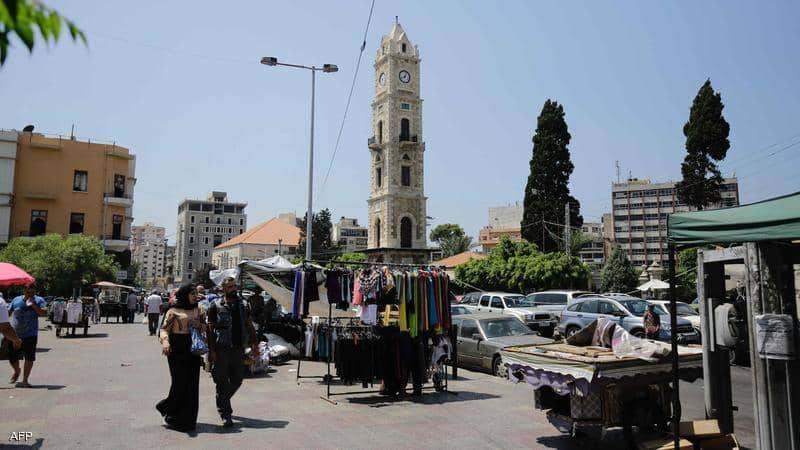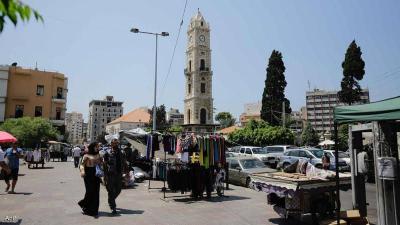Under the title "Complete Paralysis in the Markets: Sad Scenes Stealing the Joy of Eid from Lebanon," Sky News reported that the manifestations of celebrating Eid al-Adha were absent across all Lebanese regions this year due to the country experiencing a complete collapse of all sectors without exception, alongside a severe economic crisis resulting from the devaluation of the lira and exorbitant price hikes affecting food, consumer goods, and fuel. Eid al-Adha is typically a religious occasion that reflects social solidarity and the tradition of sacrifices in Lebanon, as in other Arab countries, but this year, the situation has changed in the "Land of the Cedars." These celebratory aspects have become limited to a few expatriates who traveled specifically to Lebanon, while some voluntary efforts have continued despite the forced absence, in addition to some relief organizations providing minimal humanitarian needs.
**Stagnation and Disappointment**
Yusuf Abu Nuh, a clothing and shoe store owner in the Bar Elias market in the Beqaa Valley, told Sky News Arabic: "Our situation is catastrophic... market activity does not exceed 5 percent, while consumers do not accept the new prices and the rapid daily changes in the dollar exchange rate, which is clearly reflected in the prices of clothing and shoes." He added, "If we sell 10 pieces, we cannot repurchase them again. Our capital is collapsing before our eyes... During Eid al-Fitr, the dollar exchange rate was around 12,000 lira, and the situation was better than what Lebanon is experiencing today with an exchange rate that jumps moment to moment, currently at around 22,000 lira." Abu Nuh continued: "Consumers have turned to (European stores) selling used clothing."
**Between Expatriates and Residents**
Mahmoud al-Nablsi, the servant of the Grand Al-Mansoori Mosque in Tripoli and a father of three, mentioned: "With all due respect, we were chosen by representatives of (the Association of Tripoli Expatriates.. Our Eid is One), a group said to include the city's children from expatriates spread around the world." He continued to Sky News Arabic: "Eid gifts were distributed to children, and we received a voucher for buying Eid clothing, and we were also pleased to be provided with medications," noting the "remarkable organization" of this group, which clothed many families and their children in the city. Al-Nablsi expressed hope that traders and businesspeople would create job opportunities for the people of Tripoli and requested that the "association" file a complaint on behalf of residents against politicians to the United Nations, hoping this experience would be replicated in all Lebanese regions.
**Sidon**
For his part, the deputy secretary of the Sidon Traders Association in southern Lebanon, Wael Qasab, stated: "A significant problem lies in the loss of diesel from the markets. We are working on distributing diesel to hospitals and commercial stores, but we are suffering from a severe shortage, which negatively impacts market and store lighting." He added to Sky News Arabic: "For the first time in the holiday season, Sidon markets do not open at night; in the week leading up to Eid, we could not secure diesel for the stores except for a few hours." He continued: "Lebanese people are suffering from weakened purchasing power, with the dollar exchange rate exceeding 23,000 lira, and market activity is limited to expatriates. The situation is tragic, and family heads search for stores that sell inexpensive necessities from Asian sources. Most sweet shops have closed, and there is no joy for Eid with the complete absence of decorations."
Citizen Othman Saab confirmed that "market activity is non-existent, except for a few expatriates, especially after the purchasing power of citizens has evaporated. Strolling around the markets has mostly become (for window shopping) and nothing more." Economic specialist Raed Al-Khatib noted: "The situation is catastrophic for the middle class, which has descended into greater poverty; a qualified employee's salary of about 3 million lira, which was previously equivalent to around 2,000 dollars, is now 140 dollars." He added: "This means their daily income does not exceed 5 dollars. The salary is reduced to a level lower in a country where the minimum wage is just 750,000 lira, or about 30 dollars a month, which translates to just one dollar a day; this is a disaster in itself."
As for market activity, Al-Khatib clarified that it is "stagnant, and traders are always trying to raise the price of goods, deepening the crisis coupled with social problems and tensions," as seen in Tripoli, where a decline of more than 90 percent is recorded after residents from neighboring areas stopped visiting the city due to a lack of gasoline and shocking price increases in clothing and Eid-related items. He concluded his comments to Sky News Arabic by confirming that Lebanese spending "has increasingly gone toward securing food and essential medications."




